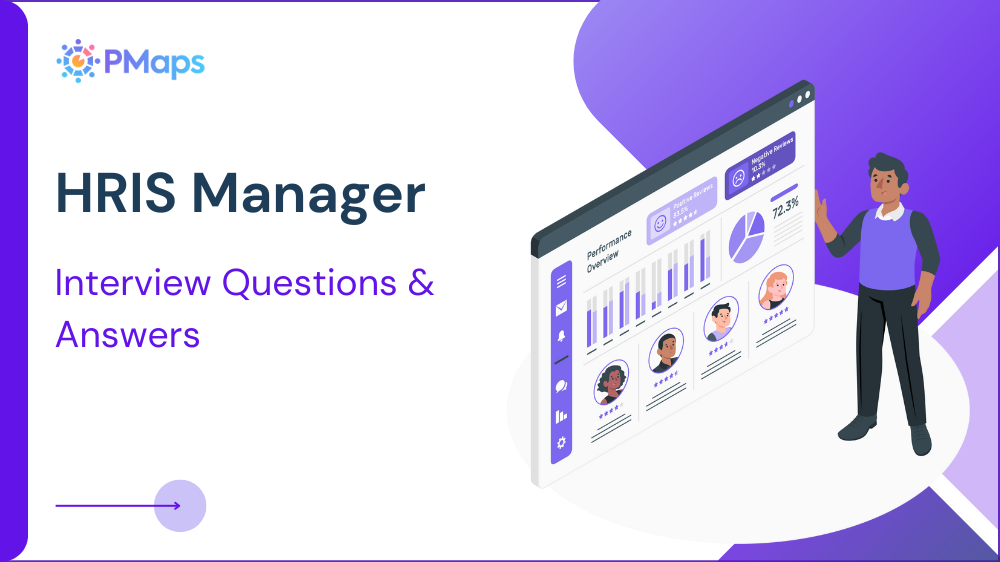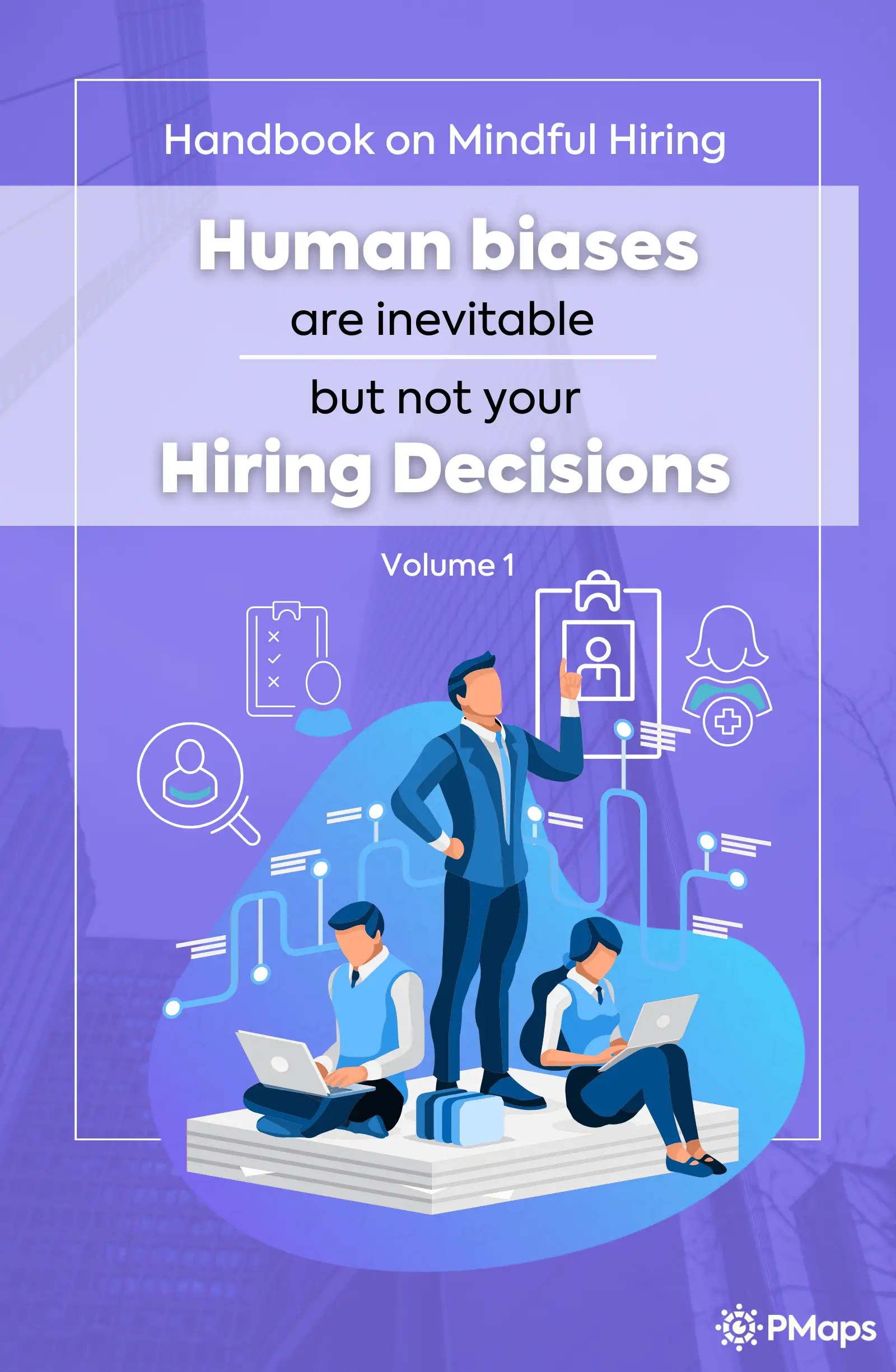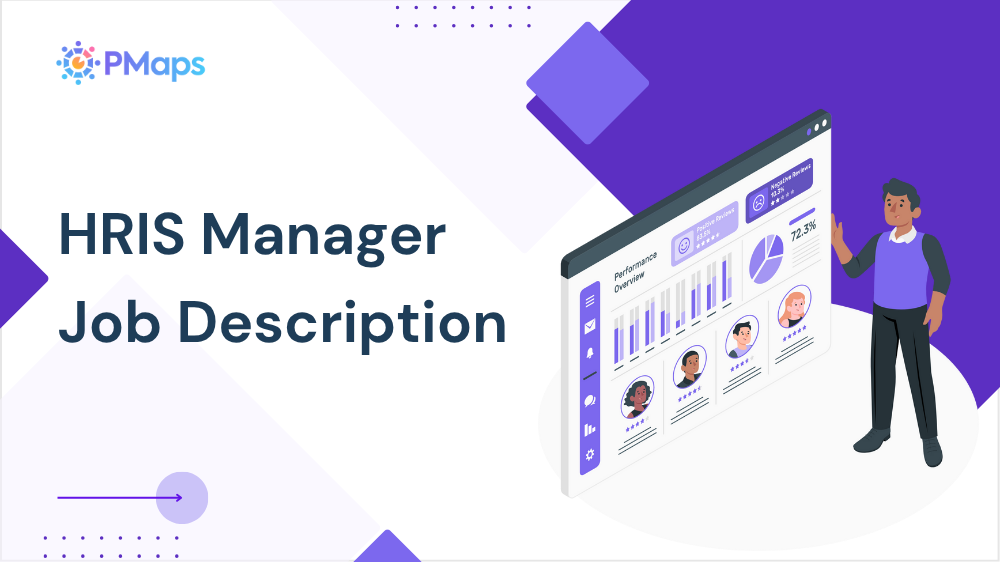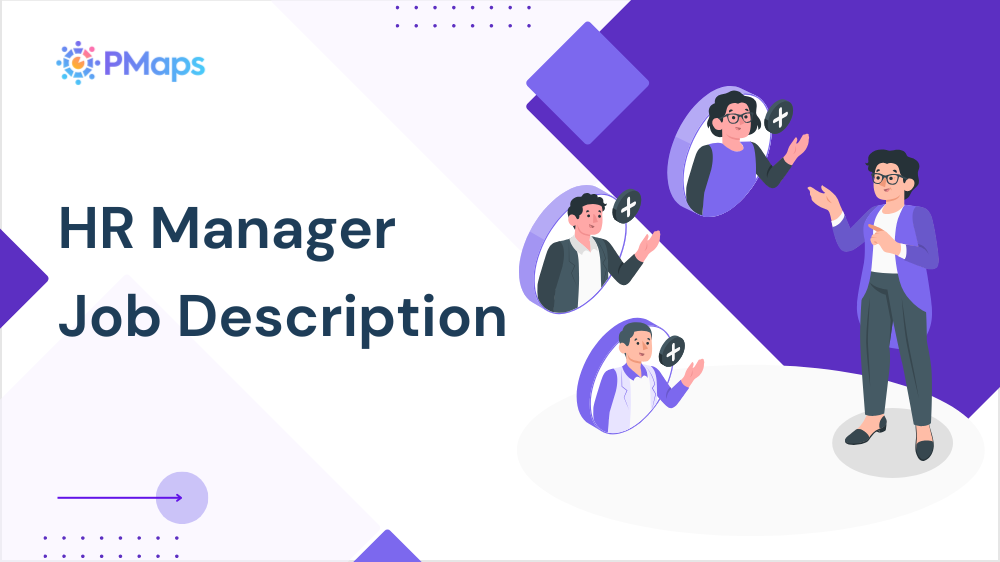
HRIS Manager interview questions are essential for evaluating a candidate’s ability to manage, maintain, and optimize Human Resource Information Systems across an organization. This role is central to data accuracy, HR operations, and compliance integrity.
Successful HRIS managers bring strong technical skills, vendor management experience, and a clear understanding of how system workflows support people processes. This guide presents structured interview questions across general, behavioral, situational, and technical categories to help you identify candidates who ensure HR data systems run efficiently, securely, and in alignment with business needs.
Interview went well? Validate system knowledge with the HRIS Manager Skills Test

General Interview Questions for HRIS Manager
These questions help evaluate a candidate’s understanding of the HRIS function, its relationship to broader HR operations, and their ability to lead system-related projects. Strong answers should reflect experience with systems management, process alignment, and data governance.
1. What do you see as the core responsibilities of an HRIS Manager?
What it Assesses:
Clarity on role scope, system ownership, and HR operations alignment.
What to Listen For:
Expect responses that include HR system configuration, user support, data integrity, reporting, compliance, and process automation.
Sample Ideal Answer:
“An HRIS Manager ensures the system supports all HR operations from data accuracy to workflows and reporting. I manage configuration, vendor relations, and partner with HR to streamline processes.”
2. How do you ensure data accuracy within an HRIS?
What it Assesses:
Data governance mindset and attention to system reliability.
What to Listen For:
Look for scheduled audits, automation rules, exception reporting, and end-user training to reduce entry errors.
Sample Ideal Answer:
“I run monthly data audits, apply validation rules during data entry, and provide training to HR users. We also track correction history to prevent repeat issues.”
3. What are some challenges you’ve faced while managing HR systems?
What it Assesses:
Problem-solving experience, change management, and adaptability.
What to Listen For:
Look for examples involving system limitations, data migrations, integration gaps, or user resistance—with clear steps taken to resolve them.
Sample Ideal Answer:
“We faced integration delays during a payroll migration. I worked with the vendor to realign timelines, adjusted our testing plan, and added extra QA steps to ensure accurate output.”
4. How do you collaborate with HR, IT, and other departments on system changes?
What it Assesses:
Cross-functional communication and stakeholder management.
What to Listen For:
Strong candidates will describe joint planning, structured feedback loops, and shared testing before rollout. Coordination is key.
Sample Ideal Answer:
“I create project plans with HR and IT, hold weekly check-ins during changes, and pilot updates with a small user group before full deployment.”
5. Which HRIS platforms have you worked with, and what features have you used extensively?
What it Assesses:
Tool fluency and practical experience with platform functionalities.
What to Listen For:
Expect mentions of platforms like Workday, SAP SuccessFactors, Oracle HCM, or BambooHR—and familiarity with workflows, reporting, and role-based access control.
Sample Ideal Answer:
“I’ve worked on Workday and SAP SuccessFactors. I manage user roles, configure business processes, and handle data reporting for payroll, benefits, and employee records.”
Behavioral Interview Questions for HRIS Manager
These questions reveal how a candidate has handled real-world challenges in managing HR systems, aligning with HR needs, and improving data processes. Look for structured responses that demonstrate system ownership, collaboration, and continuous improvement.
1. Tell me about a time you led a successful HRIS implementation or upgrade.
What it Assesses:
Project management skills, system knowledge, and stakeholder coordination.
What to Listen For:
Look for end-to-end leadership, timeline management, testing strategy, and business alignment.
Sample Ideal Answer:
“I led an HRIS upgrade to include time tracking. I gathered requirements, built a testing plan, coordinated with IT, and launched in phases to ensure user adoption and system accuracy.”
2. Describe a situation where inaccurate HR data caused issues. How did you address it?
What it Assesses:
Accountability, root cause analysis, and proactive improvement.
What to Listen For:
Expect detailed responses involving audit, process change, or user retraining. Candidates should highlight preventive action, not just corrections.
Sample Ideal Answer:
“A data mismatch caused incorrect payroll. I traced the source to manual entry, added validation fields, and trained the HR staff. The error rate dropped significantly in the following cycle.”
3. Share an example where you managed system changes that impacted multiple departments.
What it Assesses:
Cross-functional influence, communication strategy, and system awareness.
What to Listen For:
Candidates should describe stakeholder updates, change documentation, and a structured rollout that minimizes disruption.
Sample Ideal Answer:
“We changed the leave management module. I met with HR, finance, and managers to align expectations, created user guides, and supported the rollout with live feedback sessions.”
4. Tell me about a time you had to train non-technical users on HRIS functionality.
What it Assesses:
Communication skill, patience, and user-focused thinking.
What to Listen For:
Look for clear training plans, simplified messaging, and follow-up support. Candidates should show empathy for users unfamiliar with tech.
Sample Ideal Answer:
“I created role-based training for managers, used real examples, and followed up with quick guides and one-on-one help. Support tickets were reduced significantly after the sessions.”
5. Describe a time you handled resistance to a new HR technology or feature.
What it Assesses:
Change leadership and stakeholder sensitivity.
What to Listen For:
Expect empathy, education, and collaborative adjustment. Candidates should explain how they addressed feedback and ensured eventual buy-in.
Sample Ideal Answer:
“Some managers resisted using the self-service portal. I gathered concerns, simplified the interface, and offered quick walkthroughs. Adoption increased after we addressed usability issues.”
Situational Interview Questions for HRIS Manager
Situational questions assess how a candidate would handle upcoming HRIS challenges. They reveal how the individual anticipates risk, manages uncertainty, and applies system logic to ensure accuracy, efficiency, and internal alignment.
1. Your HR team requests a new workflow that the current system doesn’t support. How would you respond?
What it Assesses:
Feasibility analysis, stakeholder management, and creativity within system constraints.
What to Listen For:
Candidates should explain how they evaluate requests, explore alternatives, communicate limitations, and document outcomes or future plans.
Sample Ideal Answer:
“I’d review the request with HR, check if a workaround exists, and consult with the vendor. If not feasible, I’d offer alternatives or log the feature for the next upgrade cycle.”
2. You’re asked to integrate the HRIS with a third-party payroll provider. How would you approach this project?
What it Assesses:
Integration planning, collaboration, and technical understanding.
What to Listen For:
Look for a structured plan—requirements gathering, data mapping, testing cycles, stakeholder coordination, and fallback procedures in case of delays.
Sample Ideal Answer:
“I’d meet with payroll and IT to define integration points, prepare test datasets, and create a timeline. I’d validate output and ensure rollback procedures before going live.”
3. You discover that multiple users have access levels that exceed their job roles. What steps would you take?
What it Assesses:
Security awareness, role-based access control, and corrective action planning.
What to Listen For:
Strong responses should include role audits, access cleanup, policy review, and user communication to maintain trust and compliance.
Sample Ideal Answer:
“I’d audit current access, reassign correct permissions, and implement a review process to prevent future mismatches. I’d notify users with a clear explanation of the change.”
4. An urgent report is needed for the leadership team, but the data required isn’t available in the current dashboard. What would you do?
What it Assesses:
Analytical flexibility, reporting acumen, and resourcefulness under pressure.
What to Listen For:
Candidates should mention manual data pulls, cross-referencing systems, and clear documentation for repeat use. Bonus if they offer a permanent solution afterward.
Sample Ideal Answer:
“I’d gather the needed data from exports, build the report manually, and flag the gap for dashboard improvement. I’d also schedule automation for future use.”
Technical or Functional Interview Questions for HRIS Manager
This section evaluates how well a candidate understands the core functionality, structure, and administrative responsibilities of HR systems. Answers should demonstrate fluency in tools, process thinking, and system reliability under business pressure.
1. How do you manage user access and permissions in an HRIS?
What it Assesses:
Security, role-based access logic, and operational control.
What to Listen For:
Candidates should describe role mapping, permission audits, and procedures for onboarding/offboarding access securely and efficiently.
Sample Ideal Answer:
“I define access roles by job function, conduct quarterly audits, and work with IT for secure provisioning. All changes are logged with manager approvals.”
2. What process do you follow for system upgrades or patches?
What it Assesses:
Maintenance scheduling, vendor coordination, and risk mitigation.
What to Listen For:
Strong candidates will mention staging environments, UAT (user acceptance testing), stakeholder communication, and rollback protocols.
Sample Ideal Answer:
“I apply updates first in a test environment, validate workflows, and confirm with key users. Once stable, we schedule the live update with a communication plan.”
3. How do you build and automate HR reports in your system?
What it Assesses:
Reporting capability, data knowledge, and dashboard logic.
What to Listen For:
Look for use of pre-built templates, custom fields, scheduling reports, and ability to segment data based on filters like region, department, or role.
Sample Ideal Answer:
“I use built-in templates for common reports and create custom dashboards for leadership. I schedule monthly exports and set up alerts for key metrics.”
4. What key data fields must be validated during a system migration?
What it Assesses:
Data mapping skills, HR process alignment, and system accuracy.
What to Listen For:
Expect references to employee IDs, job titles, compensation fields, benefits status, and historical records. Bonus if they mention reconciliation techniques.
Sample Ideal Answer:
“I prioritize employee identifiers, pay rates, department data, and benefit status. I validate sample records across both systems and run QA reports for consistency.”
5. How do you support system users with troubleshooting and training?
What it Assesses:
End-user support, documentation, and training processes.
What to Listen For:
Candidates should discuss help desk processes, training guides, onboarding sessions, and their role in resolving or escalating technical issues.
Sample Ideal Answer:
“I maintain a ticketing log, publish user guides, and host refresher sessions quarterly. For recurring issues, I update FAQs or improve system prompts.”
Need more clarity on expectations? Revisit the HRIS Manager Job Description to align your next steps.
Pro Tips for Interviewing an HRIS Manager
HRIS Managers play a critical role in operational efficiency and data integrity. These tips help hiring managers identify candidates with both technical competence and the ability to manage cross-functional HR system responsibilities.
1. Ask how they manage change across stakeholders.
System changes affect HR, payroll, and leadership. Ask how they coordinate updates, gather feedback, and communicate with users. Look for signs of structured planning and strong cross-team relationships.
2. Check their reporting and data logic.
HRIS Managers should know what to track and how to present it. Ask about the last report they built and how it supported decision-making. Their answer will reflect both business awareness and system fluency.
3. Explore how they prevent and correct data errors.
Accuracy is critical in HR data. Ask how they structure audits, catch mismatches, and reduce manual entry issues. Look for routine checks and automation strategies that help reduce avoidable mistakes.
4. Evaluate how they support users with different skill levels.
Not all HR users are tech-savvy. Ask how they’ve trained or supported end users in the past. Strong candidates simplify system complexity through clear documentation and responsive support.
5. Ask how they handle vendor relationships.
Third-party systems often require external coordination. Ask about vendor escalations, upgrade timelines, or license management. Their ability to manage external timelines is as important as internal support.
Conclusion
HRIS Managers ensure the reliability, security, and efficiency of your entire HR technology ecosystem. Their work supports everything from hiring and payroll to compliance and leadership reporting.
The interview questions in this guide are designed to help you assess system expertise, project experience, and operational foresight with consistency and depth. To simplify candidate evaluation for technical HR roles, you can book a free demo or contact our team at 8591320212 or assessment@pmaps.in.









